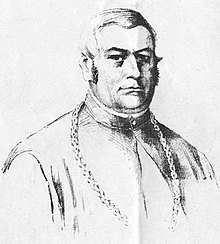Bernhard Bogedain
Bernhard Bogedain (also Bernard Jakób Bogedain ; born September 11, 1810 in Froebel near Glogau , Lower Silesia ; † September 17, 1860 in Pless , district of Pless ) was a Roman Catholic clergyman and school councilor . From 1858 until his death in 1860 he was auxiliary bishop and canon in Breslau .
Life
His parents, who owned a farm in Froebel near Glogau, were Johann Joseph Bogedain and Anna Rosina, nee. Gottlieb. Bernhard Bogedain attended the Catholic high school in Glogau, which he graduated from high school in 1831. He then studied Catholic theology at the University of Breslau from 1831 to 1833 . As his uncle was a Cistercian from the Obra Monastery , Bogedain entered the Archbishopric Seminary in Poznan in the fall of 1933 . There he was ordained a priest on June 22, 1834 and then worked as a pastor in Grätz and from 1835 in Bromberg , where he also worked as a religion teacher. In 1837 he was hired by the Poznan administrative district as a religion teacher at the teachers' college. This was located in the rooms of the former Paradies monastery in Schwiebus . In 1840 he was appointed director. In 1844 he moved to Poznan as a government and school councilor . In 1848 he returned to Silesia and was hired as a school councilor by the Opole administrative district in Opole . In order to enable the children from Polish-speaking families a better career advancement, he advocated bilingual (German and Polish) lessons. When, at the insistence of the Vicariate General in Wroclaw, the second Catholic teachers' seminar could be opened in Peiskretscham in Upper Silesia in 1849 , school councilor Bogedain hired teachers from the Grand Duchy of Poznan so that they could teach the candidate for a teaching post the Polish language. He was therefore attacked by parts of the German population. He was supported by the Bishop of Wroclaw, who, in contrast to the state authorities, tried to enforce the use of Polish in the classroom. Since the Polish-speaking population was almost entirely Catholic, the diocese of Wroclaw required all teachers in Polish-speaking areas to teach both German and Polish. Bogedain and other educators and priests called for a bilingual primary school, the use of the written Polish language , as well as Polish language lessons at the teachers' college, high schools and at the only Silesian university in Wroclaw.
On December 21, 1857, Bernhard Bogedain was appointed auxiliary bishop in Breslau and titular bishop of Hebron . At the same time he received a canonical at the Wroclaw Cathedral. The episcopal ordination by the Gnesen-Poznan Archbishop Leo von Przyluski with the assistance of the Breslau prince-bishop Heinrich Förster and the Gnesen-Poznan auxiliary bishop Franz Stefanowicz took place on May 9, 1858 in the Breslau cathedral . In recognition of his services to teacher training, the Prussian King Wilhelm II awarded him the Order of the Red Eagle .
Bernhard Bogedain died on September 17, 1860 in Pless, where he was on a visitation trip. There he was buried three days later in the church cemetery of St. Hedwig.
literature
- Joseph Jungnitz : The auxiliary bishops of Breslau. Breslau 1914, pp. 381-408.
- Ulrich Seng: The school policy of the diocese of Breslau in the 19th century. Studies of the Research Center East Central Europe at the University of Dortmund. Otto Harrassowitz Verlag, Wiesbaden 1989, ISSN 0179-6356 , ISBN 3-447-02900-5 , pp. 110, 178, 206, 208, 264, 275f., 281f., 392, 408, 430 and 432.
Web links
- Entry on Bernard Jakób Bogedain on catholic-hierarchy.org ; accessed on November 1, 2019.
Individual evidence
- ^ Arno Herzig : History of Silesia. From the Middle Ages to the present . CH Beck, Munich 2015, ISBN 978-3-406-67665-9 , p. 84.
| personal data | |
|---|---|
| SURNAME | Bogedain, Bernhard |
| ALTERNATIVE NAMES | Bogedain, Bernard Jakób |
| BRIEF DESCRIPTION | Roman Catholic clergyman and school councilor |
| DATE OF BIRTH | September 11, 1810 |
| PLACE OF BIRTH | Froebel , near Glogau , Lower Silesia |
| DATE OF DEATH | September 17, 1860 |
| Place of death | Pless , district of Pless |
